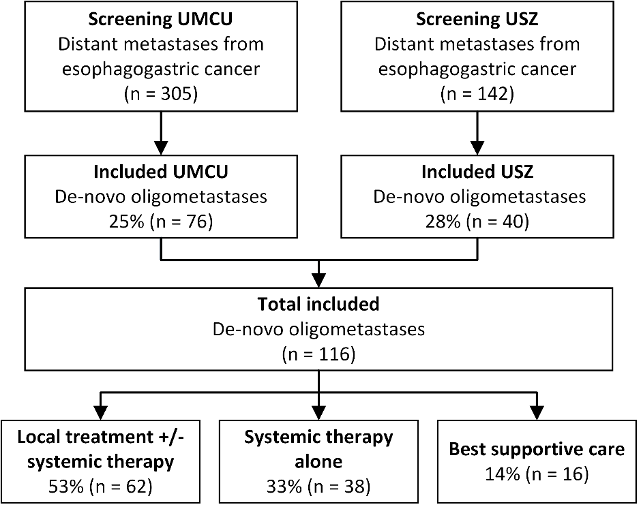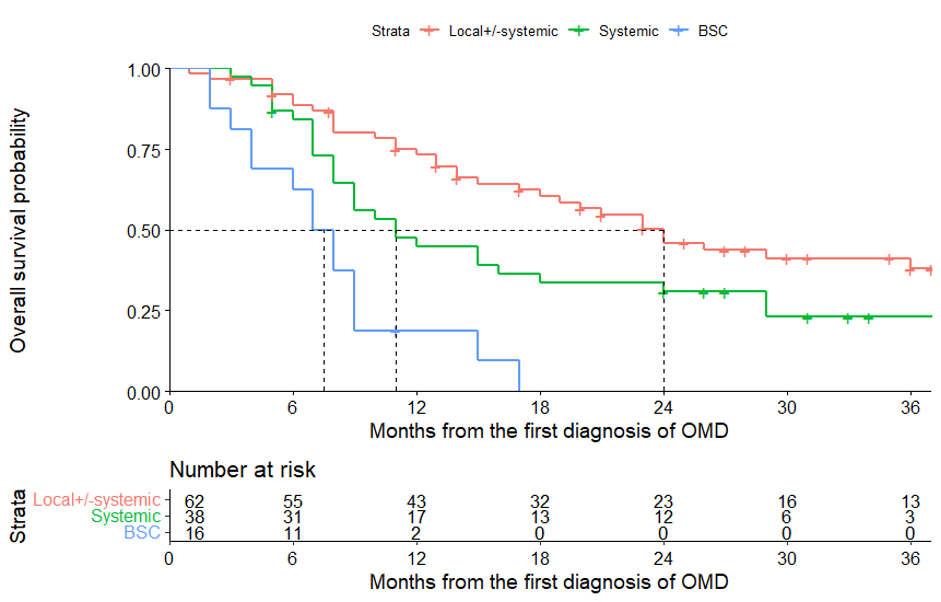Incidence and outcomes of oligometastatic esophagogastric cancer: A multicenter cohort study
Tiuri Kroese,
Switzerland
OC-0601
Abstract
Incidence and outcomes of oligometastatic esophagogastric cancer: A multicenter cohort study
Authors: Tiuri Kroese1, Sebastian Christ2, Matthijs Burger1, George Buijs1, Peter van Rossum1, Christian Gutschow3, Martin Hüllner4, Urs Mühlematter4, Richard van Hillegersberg5, Matthias Guckenberger2
1University Medical Center Utrecht, Radiation Oncology, Utrecht, The Netherlands; 2University Hospital Zurich, Radiation Oncology, Zürich, Switzerland; 3University Hospital Zurich, Surgery, Zürich, Switzerland; 4University Hospital Zurich, Nuclear Medicine, Zürich, Switzerland; 5University Medical Center Utrecht, Surgery, Utrecht, The Netherlands
Show Affiliations
Hide Affiliations
Purpose or Objective
Patients with distant metastases from esophagogastric cancer have a poor prognosis with an overall survival (OS) of 4-11 months. This multicenter study assessed the incidence and outcomes of de-novo oligometastatic disease (OMD) in patients with esophagogastric cancer in two tertiary referral cancer centers in Europe.
Material and Methods
Patients with synchronous or metachronous distant metastases from esophagogastric cancer were screened for de-novo OMD between 2015 and 2020. De-novo OMD was defined as ≤5 distant metastases detected with 18F-FDG-PET/CT imaging. Treatment for OMD was categorized into (1) local treatment, comprising of metastasectomy or stereotactic radiotherapy (SRT) with or without systemic therapy, (2) systemic therapy alone, or (3) best supportive care (BSC). Systemic therapy included chemotherapy, targeted therapy, or immunotherapy. The primary outcome was OS expressed with 95% confidence intervals (CIs). OS was calculated from the first diagnosis of OMD and was compared using log-rank test.
Results
A total of 447 patients with distant metastases from esophagogastric cancer were screened of whom 116 patients (26%) with de-novo OMD were included. The incidence of de-novo OMD was comparable between the two centers (25% versus 28%; Figure 1). The majority of included patients had adenocarcinomas (88%) of the esophagus (74%), and synchronous OMD (57%). The number of OMD lesions was 1 (57%), 2 (22%), 3 (10%), or >3 (11%). Treatment for OMD was local treatment with or without systemic therapy (53%), systemic therapy alone (33%), or BSC (14%). Median follow-up time was 13 months (interquartile range: 7-26). OS was 23.0 months (95% CI: 18-58) after local treatment for OMD with or without systemic therapy, 11.0 months (95% CI: 9-29) after systemic therapy alone, and 7.5 months (95% CI: 4-NA) in patients having received BSC (p<0.0001; Figure 2).


Conclusion
The incidence of OMD in patients with esophagogastric cancer was comparable between the two centers in this international multicenter study. Metastasectomy or SBRT for OMD (with or without systemic therapy) was associated with better OS in this selected cohort.